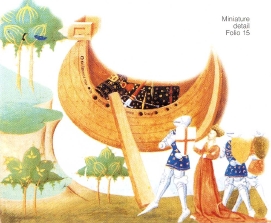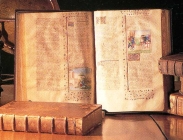| | The Quest of the
Holy
Grail "Queste du Graal" Dijon, Bibliothèque Municipale, ms 527 Deluxe facsimile edition: • original format 32 x 41.5 cm, 326 pp • Limited edition of 987 copies • A co-production of the Bibliothèque de la Ville de Dijon & Ediciones Grial • Euro 2,400 (please call for OMI price) |  |
|
|  The literary cycle around the mythic Holy Grail produced one of the most beautiful prose texts of all times, in which fantasy is combined with spirituality in such a way that it became the basis for the chivalresque novels to come later. "The Story of the Holy Grail" is the best known work by Chrétien de Troyes. A new spiritual tendency colored with Christianity is added here to the legends of King Arthur and his knights. Not by accident it is the moment of the Third Crusade. The knights, now horsemen at God's service, will give a much more trancendental sense to their | | adventures impregnating the literature with a profound religiousness. Chrétien de Troyes did not finish his story and many successors developed his initial theme. Around 1220 one or more authors, in a successively collective work, came up with the most beautiful cycle of medieval literature. These prose geniuses, even anonymous ones, wrote what is known as the "Vulgata" or the "Great Holy Grail". The vulgata is made up of three parts: "Lancelot", "The Quest or Demand of the Grail", and "The Death of King Arthur". Without a doubt, "The Quest for the Holy Grail" is the most impressive and best written of the trilogy. In this manuscript the knightly and courteous virtues are transformed into Christian virtues and they are colored with the spirit of reform and purity of faith which the Cistercian Order upholded. The banner of this new spirituatlity will be Galaad, the knight | | amongst the knights, the chosen one to initiate and conclude with success the quest for the Holy Grail. The knights who start out from Camelot with Galaad on this quest will come across a multitude of adventures on their way, as well as unbelievable dangers, but also the mystic guidance of the Holy Cup, a symbol which will supply them with the interior strength needed to conclude such a fascinating adventure. One of the most beautiful manuscripts of the Holy Grail Cycle is under the custody of the old chapel of the Jesuit School (now in the Bibliothèque Municipale), an early 15th-century codex containing over 50 miniatures, rich capital letters and a profusion of ornamented borders decorated with exquisite details. |
| OMI - Old Manuscripts &
Incunabula PO
Box 6019 FDR Station New York NY 10150 tel/fax 212/ 758-1946 • http://www.omifacsimiles.com • immels@earthlink.net |